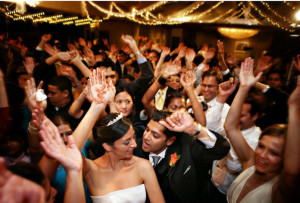 As I’ve previously alluded to on this blog, the music played at any party can either make or break the affair. A party is simply not a party without a huge helping of great music, and hence your choice of the musical entertainment at the reception is one of many wedding planning decisions that should never be taken lightly. Obviously, you could opt for either a wedding band or a DJ, but wedding DJs are a far more popular choice (at about a 75% / 25% ratio). Thus, the purpose of today’s post is to offer a few tips to get the most out of your chosen DJ.
As I’ve previously alluded to on this blog, the music played at any party can either make or break the affair. A party is simply not a party without a huge helping of great music, and hence your choice of the musical entertainment at the reception is one of many wedding planning decisions that should never be taken lightly. Obviously, you could opt for either a wedding band or a DJ, but wedding DJs are a far more popular choice (at about a 75% / 25% ratio). Thus, the purpose of today’s post is to offer a few tips to get the most out of your chosen DJ.
Hiring Your Wedding DJ
The first and probably most obvious piece of advice is to shop around. Of course this concept applies to pretty much every aspect of your wedding, but the quality of any DJ is likely hit or miss, especially since you cannot touch, taste or feel the “product” beforehand. So, what’s a bride or mother of the bride to do? The answer is to get referrals and references. Ask vendors, friends, the venue manager, recently-married people, or in-the-know relatives for recommendations. Do some research online (check out this wedding DJ resource list from theknot.com), and call a few DJs from the local phone book and ask for references. Basically, this is one decision where the price tag is not all that critical, as the price does not always correlate with the quality. Conversely, the most important factor on the DJ decision is finding someone who is a proven commodity, and the only way to determine that is to analyze the experiences of others who have used his or her services.
Laying Out the Ground Rules
Once you’ve hired your wedding DJ, the next step is to establish the ground rules of the vendor relationship. For example, make it clear that YOU are the boss, and let the DJ know whether or not he or she has any leeway whatsoever in terms of the playlist, sequence of activities, entertainment segments, etc. The good part about this is that most DJs (particularly good ones) are extremely busy and have a low tolerance for ambiguity, so a direct approach is usually well received. You might even want to put the rules in writing so that there is no confusion down the road. Just be careful not to act like a complete and total jerk to the guy – thorough and direct, yet polite, communication is the key.
One of the most, if not the most, critical things you must do is to define your desired playlist, and this should be provided to your DJ at least 2 months in advance if possible. You must think about the songs you want played during the cocktail hour, entrance ceremony, bridal party introductions, first dance, mother/son dance, dinner, cake cutting, last dance, etc. Also, most DJs will field requests from the wedding guests to play songs not on the playlist, so you’ll need to let the DJ know if this is ok or not. You might also wish to create a “do not play” list containing songs that you absolutely do not want to hear at your reception (i.e., Electric Slide, Gangnam Style, etc.).
The other wedding DJ ground rules are relatively obvious and generally apply to any vendor relationship. For example, the DJ needs to know when to arrive, when to close up shop, and whether or not the possibility of overtime exists. Also, if some of your guests are elderly, then you would be wise to have a chat with the DJ about the decibel level of his or her music. Also, have a discussion about the wedding traditions that you’d like the DJ to manage as part of the reception ceremony. For example, if you decide to forego the tossing of the bouquet, let the DJ know. The bottom line here is to use some good old fashioned common sense.
Conclusion
Your choice of wedding DJ can truly make or break your big day. Make sure you hire based on referrals from people you trust, and then clearly and unambiguously communicate the ground rules. One additional point: I am an advocate of allowing your DJ to have some leeway in terms of what he or she plays. The reason is that a good DJ can read the crowd, and can serve up music at key times that the crowd will feed off of. This can literally mean the difference between having background music and having a full blown party with everyone “getting down” on the dance floor. So, my advice is to leave a little wiggle room…otherwise, you might as well just queue up the CD player! Good luck!



Speak Your Mind